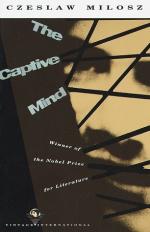
|
| Name: _________________________ | Period: ___________________ |
This test consists of 5 multiple choice questions, 5 short answer questions, and 10 short essay questions.
Multiple Choice Questions
1. Where did the man Gamma grow up?
(a) The country.
(b) An eighteenth-century palace.
(c) The city.
(d) A party member's home.
2. When man is faced with constant death and when life seems meaningless, how does dialectical materialism seem?
(a) Like a refuge.
(b) Useless and outmoded.
(c) Mathematical and calculating.
(d) Mysterious and full of meaning.
3. During Gamma's youth, Poland gradually separated along what lines?
(a) The nationalistic right and socialist left.
(b) Pro-Semitic and anti-Semitic.
(c) The capitalists and communists.
(d) The traditional right and Soviet left.
4. Why do Party dialecticians change the Method when necessary?
(a) History has destroyed all other formulae which claim to be unerring.
(b) Reality proves the Method to be unworkable.
(c) They want to stay one step ahead of the reactionaries.
(d) They are forced to modernize.
5. In the concentration camp, what is Beta's job?
(a) Rationing food to the prisoners.
(b) Removing bodies from the gas chambers.
(c) Directing Jews to the gas chambers or work.
(d) Unloading Jews from the box-cars.
Short Answer Questions
1. As detailed in Chapter 6, what was the first maxim of the communist rule as it established power in a newly-conquered country?
2. How was Delta's cheerful poetry treated?
3. Rather than condemning the four men about whom he writes, how does Milosz open Chapter 8?
4. What was the result of this group created by Gamma and his friends?
5. After two years, Delta returned again to favor, and how did his future look?
Short Essay Questions
1. Why does Milosz go to such pains to describe Gamma, when the other writers found in his book are given only a few sentences of description?
2. Delta, in wandering the roads in France, met people from many different nations. How did this universal migration prepare the way even more for communist rule?
3. How does the party's definition of a reactionary reduce him to a comic level?
4. In Chapter VIII, Milosz takes on the tone of a communist to describe the evils of the various classes. How is this more powerful than a mere description?
5. Nearly six years of Nazi rule had radically changed people's ideas of private property. Did this help or harm the communist idea of common property?
6. "Still, it was not easy to become a communist, for communism meant a complete revision of one's concepts of nationality " (pg. 147). How was this true?
7. Milosz writes that Delta could not (or would not) distinguish between truth and fable, even in his personal life. Is this the kind of mind the Party would have wanted?
8. Eventually Delta's poems became something of a dream, unreal. How was this inevitable?
9. Under communist rule, education is from a strictly materialistic view. Why is this necessary to maintain proper thought among the citizens?
10. How were Beta's stories a fitting insight into his nihilist worldview?
|
This section contains 1,344 words (approx. 5 pages at 300 words per page) |

|




